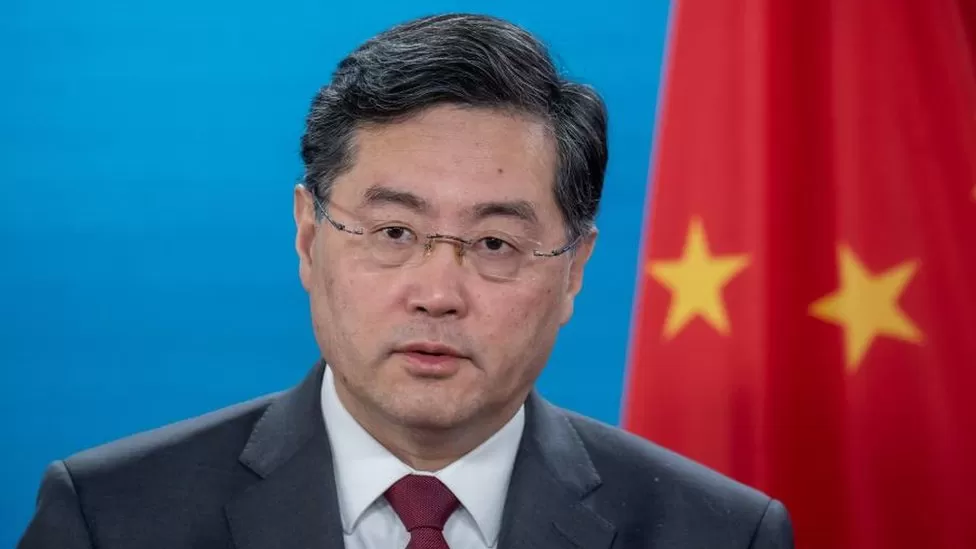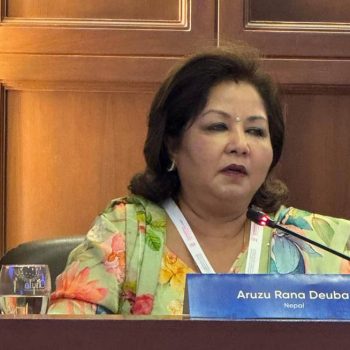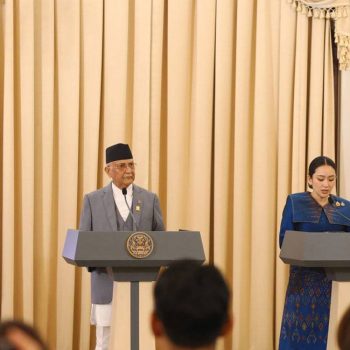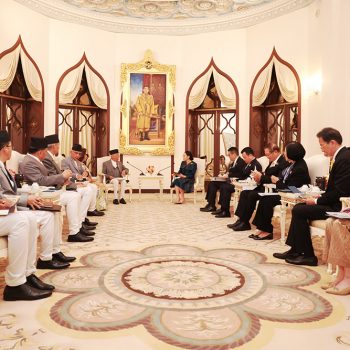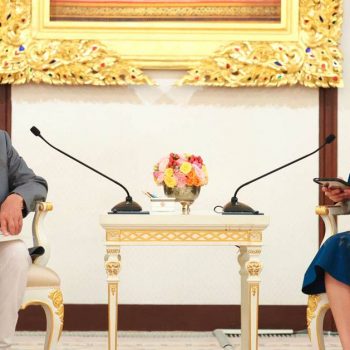In a surprise tweet, Twitter CEO Jack Dorsey said he’s stepping down
 NepalPress
NepalPress

In announcing his surprise resignation on Monday, Twitter CEO Jack Dorsey was characteristically off-the-cuff.
“Not sure anyone has heard, but I resigned from Twitter,” he tweeted unexpectedly, ending his parting missive about the company’s future with “Hi mom!”
For over 15 years, Dorsey‘s freewheeling approach has helped him become an iconic figure in Silicon Valley. He was the first tech CEO to penalize former president Donald Trump, after years of boundary-pushing tweets. He declared in 2018 that Twitter was broken in fundamental ways and invited outsiders to help the company figure out how to prioritize the “collective health” of the platform. And in March, he appeared before Congress sporting a scruffy beard and nose ring, and irked lawmakers by tweeting during the hearing.
But Dorsey has also earned a reputation as a chaotic and distant manager who vexed Wall Street and sometimes befuddled his own employees. Well before the pandemic, he announced in a late-night email that everyone could work from home forever — without alerting the company’s head of human resources. He floated plans to move to Africa during the pandemic.
Dorsey has faced pressure over the past year to depart, as investors who pushed for his ouster argued he was overcommitted because he is also CEO of payments company Square. And soon after Dorsey’s resignation was reported Monday, Twitter’s stock price soared before ending the day down slightly, The Washington Post reported.
Dorsey’s departure, which he said would be effective immediately, is unlikely to change Twitter’s direction in the short term because he was already a very hands-off manager, said people familiar with his leadership style who spoke on the condition of anonymity to describe sensitive matters. He will be replaced by chief technology officer Parag Agrawal, an engineer who worked his way up through the ranks over a decade and is considered to be in lockstep with Dorsey on his ideas about Twitter’s future.
The company has set aggressive new targets for user growth, and is experimenting with a paid subscription service and an audio platform. Dorsey said he will remain on the company’s board until around May, but then will leave to “give Parag the space he needs to lead.”
Dorsey’s stepping aside represents a changing of the guard in Silicon Valley, and hints at the future for an industry that is battling regulators globally and has faced scathing criticism for its role in promoting misinformation and other societal ills. In his departure letter, Dorsey said that the business community placed too much emphasis on the value of companies that are led by their founders.
“Ultimately, I believe that’s severely limiting and a single point of failure,” he wrote. “I’ve worked hard to ensure that this company can break away from its founding and founders.”
The comment appeared to be a jab at Facebook CEO Mark Zuckerberg, whose singular control over key company decisions, critics have charged, has exacerbated its problems. (Twitter’s former head of communications tweeted the resignation letter and encouraged Dorsey to keep “trolling Zuck.”) With the resignation of Amazon CEO Jeff Bezos this year and the departure of Google’s founders in recent years, Zuckerberg is now the last among a group of prominent Silicon Valley founders to stay on as CEO.
Dorsey’s surprise move caused the Nasdaq composite index to suspend trading on Twitter’s stock, and left most employees — many of whom were not working because it was an official company “Day of Rest” — in a state of confusion.
“I’m gonna need a day of rest for the day of rest,” one tweeted.
A screenshot of internal workplace chats obtained by The Washington Post showed Twitter employees reacting with red question marks, exclamation marks and a “scream” emoji when a link to CNBC, which first reported news of Dorsey’s departure, was posted.
Even some senior executives seemed unprepared for the move. Vijaya Gadde, the company’s legal, policy, and trust and safety lead, tweeted congratulations to Agrawal and gratitude to Dorsey — but said she was “saving my ‘everything I learned from @Jack’ thread for another day.”
Dorsey has been distancing himself from direct leadership for years, according to people familiar with his management style who spoke on the condition of anonymity to discuss sensitive matters. Major decisions are generally made by other company leaders, though Dorsey does give a final sign-off. He also rarely tweets about Twitter, focusing most of his public energy promoting blockchain, decentralization and bitcoin-related projects.
Though Twitter is much smaller than industry rivals Facebook and TikTok, the company punches above its weight because of its use by celebrities, politicians and other influential people. For years, the most influential user on Twitter was Trump, who used the platform as a primary means to communicate — often in ways that pushed the boundaries of Twitter’s rules. The company banned him for comments related to the Jan. 6 insurrection.
Dorsey is also a longtime free speech proponent who did not believe that platforms should heavily police the expression of their users. But he has shifted that stance in recent years in response to numerous controversies involving social media services, including abuse of social platforms by Russian operatives during the 2016 election, the spread of misinformation about the coronavirus, and rampant bullying and harassment.
Dorsey became one of the first CEOs in Silicon Valley to publicly criticize the design of social media services, with their instant feedback and viral algorithms, and to admit that they have unintended consequences in the form of unhealthy social behavior and pressure. He said in 2018 that he would be willing to hit the pause button or rethink key features like the like button or disable automatic retweeting, which the company did for a time during the election period last year. The company also created an initiative called Healthy Conversations, investing significant resources in cracking down on bullying, fake accounts and other abuses. He has opened the company’s algorithms and research to scrutiny by outsiders and developed tools for dealing with problematic accounts, such as warning labels, that other companies have followed.
That ability to be introspective and candid about the company’s problems has inspired many people to work at Twitter, which has also become a landing pad for researchers and experts that fled Facebook after becoming demoralized by its approach, The Post has reported.
“Dorsey leaves behind a mixed legacy: a platform that’s useful and potent for quick communication but one that’s been exploited by a range of bad actors, including former president Donald Trump, who did his best on Twitter to undermine democracy — until Dorsey’s people finally had enough and shut him down,” said Paul Barrett, deputy director of the NYU Stern Center for Business and Human Rights, in an email.
In his own note to staff sent out in the morning, Agrawal said that he was “honored and humbled,” by Dorsey choosing him as the successor and noted that the company had recently updated its strategy to hit ambitious goals.
Like Dorsey, Agrawal is a big believer in “decentralization” — the idea that the next generation of Internet technologies should not be controlled by one company. Agrawal has championed and pushed for Twitter to fund a technology project called Bluesky, an attempt to build that future by developing an open source and independent networking protocols for social media that different companies can use.
This approach stands in contrast to Facebook’s metaverse, a virtual reality platform that critics have argued would be controlled by Facebook (Facebook disputes this). Facebook recently changed its corporate name to Meta, which is also the name of Twitter’s machine learning research division.
A senior Twitter executive, who spoke on the condition of anonymity to describe sensitive matters, said that Agrawal was often the person implementing the technology behind Twitter’s biggest and most sensitive policy decisions.
“When Jack tells Congress that transparency builds trust, it’s Parag implementing that behind the scenes,” the person said, noting, for example, that Twitter gave users the choice between seeing a feed whose content was ranked by the company’s algorithms vs. seeing a chronological timeline.
Current and former Twitter employees described Agrawal as generally well-regarded, but also relatively untested as a manager. Two employees who spoke on the condition of anonymity said he had no direct reports for much of his tenure at the company.
While Dorsey’s decision to step down, and the choice of his successor, was closely guarded, some employees described Agrawal as a logical if slightly surprising choice. Aside from Dorsey, the company’s most visible executives in recent years have been consumer product chief Keyvon Beykpour, who oversaw the launch of new features such as Twitter Spaces, and Gadde, who navigated the company through political and legal shoals both in the U.S. and abroad.
Agrawal himself has not been a frequent tweeter in recent years, confining his posts on the platform largely to product and personnel announcements. Yet within hours of the announcement, conservatives seized on a tweet he sent in 2010 to suggest he would be biased against White people. The tweet read: “If they are not gonna make a distinction between Muslims and extremists, then why should I distinguish between white people and racists.”
The tweet was a direct quote from a “Daily Show” segment on harmful stereotypes.
“Didn’t think it could get much worse than Jack Dorsey. But yikes,” tweeted the account of the House GOP Judiciary Committee, quoting Agrawal’s 2010 tweet.
In 2020, Elliott Management, an activist-investor hedge fund, acquired a large stake in Twitter, gained a board seat, and began a public campaign to push Dorsey out as CEO.
Dorsey ultimately canceled his Africa plans amid the pressure, and focused more closely on helping Twitter release new products, including the audio service Spaces and a paid subscription service that could lure in paid creators and influencers. The company’s stock went up for a time.
A person familiar with the decision-making process, who spoke on the condition of anonymity to discuss sensitive personnel matters, said that Dorsey’s resignation was the culmination of the process that Elliot set in motion last year.
Twitter said that Parag was selected “unanimously” by the board, according to the company’s news release.
Dorsey said in his letter that this was “my decision and I own it.”







